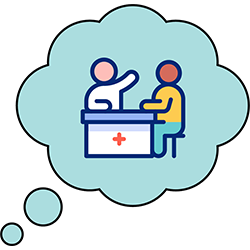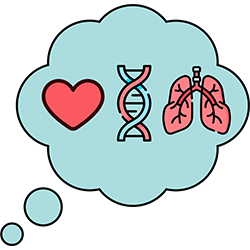You may have heard some things about taking part in health and care research that have worried you.
On this page, we discuss some of the common myths surrounding health and care research. Taking part is a big decision and it’s important you have all the facts.
Common myths about how research impacts you
You’ll be treated like a guinea pig
Whatever the type of research, anyone who is involved should be treated with respect. The research is not being done to them, but with them. People who participate in research often say that they feel well cared for. They can also contact the research team with any questions or concerns.
Our recent research participant survey found that 95% of participants either agreed or strongly agreed that researchers treated them with courtesy and respect.
Research teams must follow ethical guidance. Before the research can take place, researchers must seek approval for their plan from a Research Ethics Committee. Research involving new medicines will have gone through a process to ensure the treatment is ready for use with people. New medicines are not tested on people first. Read more about how health research is prioritised, funded, approved and regulated.
You’ll need to take a lot of drugs
Not all health and care research involves taking drugs. The research may involve testing a new device to help monitor your health or having an x-ray or scan. It could be about monitoring how certain changes in our diet and lifestyle could help the health of the UK in the future.
Research might simply involve talking to someone, completing a short questionnaire, or even using an app on a mobile device. There are also many ways to be involved in research without being a participant in a research study.
You’re putting yourself at risk
All health and care research goes through very strict ethical and regulatory checks before it can go ahead. There are lots of different ways to get involved with research. Some involve taking a new medicine or having a new form of treatment. Others may be as simple as filling out a questionnaire or giving a sample.
You can find out more about the different types of health and care research on our dedicated what is health and care research page.
People are very closely monitored while they are taking part in research. So, although health and care research is not entirely risk-free, the chances of something going wrong are small.
Your doctor will tell you about research opportunities
Not all health and care professionals will be fully informed about all the research opportunities available to you. They also might not have the time to discuss them with you in your appointment.
It is important to ask about opportunities to get involved in research as your healthcare professional can find out what might be available.
You can search for studies on this website by using the search bar at the very top of each page. Simply type in your town, postcode, body part, medicine or health condition.
You can also find studies by condition by pressing the “view conditions” button.
You’ll have to go to a hospital
Health and care research can take place in many different places – depending on the type of research. This includes healthcare settings such as hospitals and GP practices, or community settings such as schools or care homes.
It is more common than ever before for research to take place in non-clinical settings. Digital technology also provides a way for people to get involved from the comfort of their own homes.
Common myths about the role of research, who can take part and who benefits
All research studies are about finding a cure
Research aims to prevent diseases, improve care, and help find cures.
There are a range of factors which can contribute to your health. For example, where you live, what you eat and whether you have a good support network of family and friends. Public health research seeks to answer questions about some of these factors.
Research also seeks to find ways for people to live well with long-term conditions. It can help to find out the best ways to care for people living with life-limiting illness and pain, known as ‘palliative care’. Research can also lead to improvements in end-of-life care across all diseases and help patients to live in comfort and die with dignity.
Research is only focused on physical health, not mental health
Your health is not limited to a physical disease, it also includes your mental well-being.
So health and care research also seeks to answer questions about mental health. For example, whether medicine, counselling – or a combination of both – is the best treatment for people living with depression.
Due to the increased awareness of how mental health affects physical well-being, this is a growing area of health and social care research. Read about all the research happening within the NIHR specialty for mental health.
Children can’t take part
Children can take part in health and care research with the permission of their legal guardian. The research team may meet with the child to make sure they understand what the research is about. They may use pictures to explain the study.
Research in child health is vital to help find new and better ways to care for children. You can find studies for children by typing "children" in the search box at the top of this page.
Research only benefits drug companies
Health research can be funded by the government, health charities – as well as the life sciences industry (drug companies). When the NHS undertakes research specifically for life science companies, the company pays the full cost.
Everyone benefits from the development of new medicines. Without commercial drug companies there would be less research taking place – with fewer breakthroughs and discoveries.
Learn more about health and care research
Our what is health and care research page looks at the role that health and care research has in improving people’s lives.
What you can expect on a trial
Find out more about the process that most clinical studies take, and what you can expect before, during and after.
Read more on our what to expect on study page.













